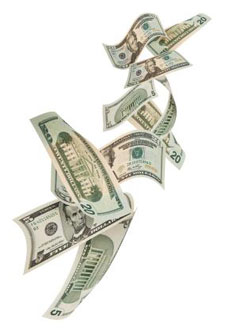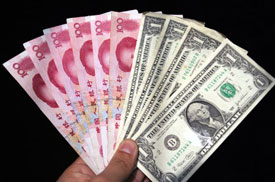Investing in China and Dow 10,000
Stock-Markets / Chinese Stock Market Mar 26, 2009 - 08:17 AM GMT Larry Edelson writes: I'll start with just a quick update on the markets. But then I'm going to take you to a deeper understanding of one of the most important subjects of our time.
Larry Edelson writes: I'll start with just a quick update on the markets. But then I'm going to take you to a deeper understanding of one of the most important subjects of our time.
So, follow along with me …
First, the Markets: We're getting the rally in stocks that I've been predicting. And I expect the Dow to rise to just over 10,000 in the months ahead.
Along with it, the dollar will tumble sharply, gold will likely zoom to new highs, oil will take off to the upside, and virtually all natural resources will start re-inflating.
Don't expect the economy to improve though. It'll stay stuck in the doldrums, to say the least.
But as I've said many times, the economy does not have to recover to get huge rallies in many markets …
The reason: When a currency is deliberately devalued, as the dollar is experiencing now, asset prices must adjust upwards to reflect the loss of purchasing power in that currency.
And this is what happens when you have floating, paper currency systems.
 |
| When a floating paper currency is deliberately devalued, asset prices must adjust upwards to reflect the loss of purchasing power in the currency. |
It's amazing how few understand it — even though it's happened in virtually every ‘third world' country over the past few decades.
The big difference now: It's happening in the ‘first world' today, to the world's biggest country with the world's biggest economy. The U.S.A.
Meanwhile, on the other side of the globe, there's a company I want to talk about today …
A Huge Company with Gigantic Sales Volume … Fat Cash Flow … And It's Extremely Profitable
The “company” is so profitable that it's putting competitors out of business left and right! Even in the midst of the worst financial crisis in decades, vendors still line up at this company's doorsteps trying to buy its goods. Its product catalogue is huge and varied.
Management is outstanding. They lead more employees than any other company in the world. After work, you can often find managers conducting aerobic activities with their staff, soccer games, and company cheerleading exercises in corporate courtyards and auditoriums. They are consummate team builders.
You're probably thinking “Wal-Mart.” But it is not Wal-Mart. I'm talking about China, Inc.
Despite all the hoopla and negative news, China is still the world's most profitable entity, exporting more goods than any other country in the world and taking in torrents of cash flow.
China's top five customers, in order of export volume in 2008 …
- European Union
- U.S.
- Hong Kong
- Japan
- ASEAN (The Association of South East Asian Nations)
Right now, the U.S. is complaining bitterly that China sells its goods too cheaply. Therefore, officials in Washington want China to revalue its currency, and make it stronger.
By doing so, the theory goes, China's exports will cost more, making U.S. goods more competitive in world markets. Hence, as U.S. exports to China pick up, the U.S. trade deficit will decline.
 |
| With its mammoth amount of cash, China continues to improve the infrastructure for its 1.3 billion citizens. |
But China isn't going to do that. China does not want a more expensive currency. Rather, it wants an even cheaper currency to boost its exports and avoid the deflationary consequences of a strong currency.
Look. China has absolutely no vested interest in a stronger currency. The country is pulling in as much as $440 billion in positive cash flow per year and has accumulated over $1.95 trillion in reserves.
With that huge stash of money, China continues to strengthen its banks, build infrastructure, and invest around the world to secure vital natural resources for its 1.3 billion citizens. And it also gets to reinvest that money in one of its biggest customers: The U.S.
So ask yourself these two simple questions:
- Why in the world would China want to do anything that threatens its cash flow?
- And why in the world would it want to negatively impact exports by raising the value of the yuan?
Any business person with a lick of common sense knows that when your company has a competitive advantage, you keep it — and protect it — for as long as possible.
Further — why in the world would China want to hurt its biggest customer, the U.S.? Or for that matter, why would the U.S. want to hurt China?
Think this through and throw conventional insight into the garbage bin while you're doing it — because during times like we have today, conventional wisdom is merely a loser's proposition.
Fact: The U.S. is the world's largest debtor.
Fact: China is the world's largest creditor.
Fact: The U.S. owes China more money than it owes any other country in the world.
Fact: China has lent the U.S. more money than it has lent any other country in the world.
Ergo …
![]() If China goes down the tubes, it would be forced to turn completely inward to protect its capital. So instead of lending the U.S. hundreds of billions by investing in U.S. debt markets, China would likely keep its capital at home.
If China goes down the tubes, it would be forced to turn completely inward to protect its capital. So instead of lending the U.S. hundreds of billions by investing in U.S. debt markets, China would likely keep its capital at home.
The ensuing collapse in the U.S. economy would make today's global financial crisis look like a Sunday afternoon walk in the park.
On the other hand …
![]() If the U.S. continues to collapse, that's obviously no good for China either. That would mean more borrowing from China, while China's exports to the U.S. simultaneously decline.
If the U.S. continues to collapse, that's obviously no good for China either. That would mean more borrowing from China, while China's exports to the U.S. simultaneously decline.
Bottom line: China and the U.S. are connected at the hip. They need each other more than ever and more than any two countries on the planet have ever needed each other .
So despite all the hoopla you hear in the press and even from Washington about China, or even threats from China towards the U.S. — don't worry too much about China and the U.S. duking it out, financially or otherwise. It's just not going to happen. It's merely a sideshow.
Instead, here's what's really going to happen between the U.S. and China …
First, the U.S. dollar is going to continue to decline. Partly because Fed Chairman Ben Bernanke knows we need a weaker dollar to help get us out of the mess we're in.
And partly because China — despite all the complaining that you're hearing from them about the sinking dollar — also wants a cheaper dollar.
“Huh?” you ask. “Has Larry lost his mind?”
No, I haven't.
 |
| The yuan and the dollar are connected at the hip. So expect both currencies to decline in the months ahead. |
You see, China needs a cheaper yuan just like the U.S. needs a cheaper dollar. With a cheaper currency, China can avoid deflation … spark inflation … and boost its exports.
So China is actually going to put a lot of pressure on its currency in the months ahead, by selling yuan and buying natural resources.
And since China's currency is still tightly pegged to the U.S. dollar, both are going to fall in value against other currencies, namely the euro.
This way, China and the U.S. get what they want: Cheaper currencies. Meanwhile, both countries' exports to the Euro region and other areas, like Canada and South America, get a huge boost.
And eventually — I predict within two year's time — we will see the euro break up. Not because it's too weak, but because it's become too strong vis-a-vis the dollar and the yuan.
In short, the Euro region will get stuck with massive deflation as the U.S. and China try to inflate their way out of the global financial crisis, together.
Somewhere along the way, also within two to three years from now, China, the U.S. and Europe will get together under a new G-20 series of meetings, and a new, single world currency will be born.
Like it or not, it's coming. First, the dollar's reserve status must come under question. And as you've seen in the markets and the press recently, that process has already begun.
Best wishes,
Larry
P.S. For real-time recommendations to profit from the markets — be sure to subscribe to my Real Wealth Report . It's a mere $99 per year, less than $9 a month! To join now, click here .
P.P.S. For more of my thoughts directly from the front lines as I travel the world, sign up for our new, daily free e-zine, Uncommon Wisdom — with even more insights on how to preserve and grow your wealth.
A subscription to Uncommon Wisdom won't cost you one red cent! Click here to subscribe.
This investment news is brought to you by Money and Markets . Money and Markets is a free daily investment newsletter from Martin D. Weiss and Weiss Research analysts offering the latest investing news and financial insights for the stock market, including tips and advice on investing in gold, energy and oil. Dr. Weiss is a leader in the fields of investing, interest rates, financial safety and economic forecasting. To view archives or subscribe, visit http://www.moneyandmarkets.com .
Money and Markets Archive |
© 2005-2022 http://www.MarketOracle.co.uk - The Market Oracle is a FREE Daily Financial Markets Analysis & Forecasting online publication.



